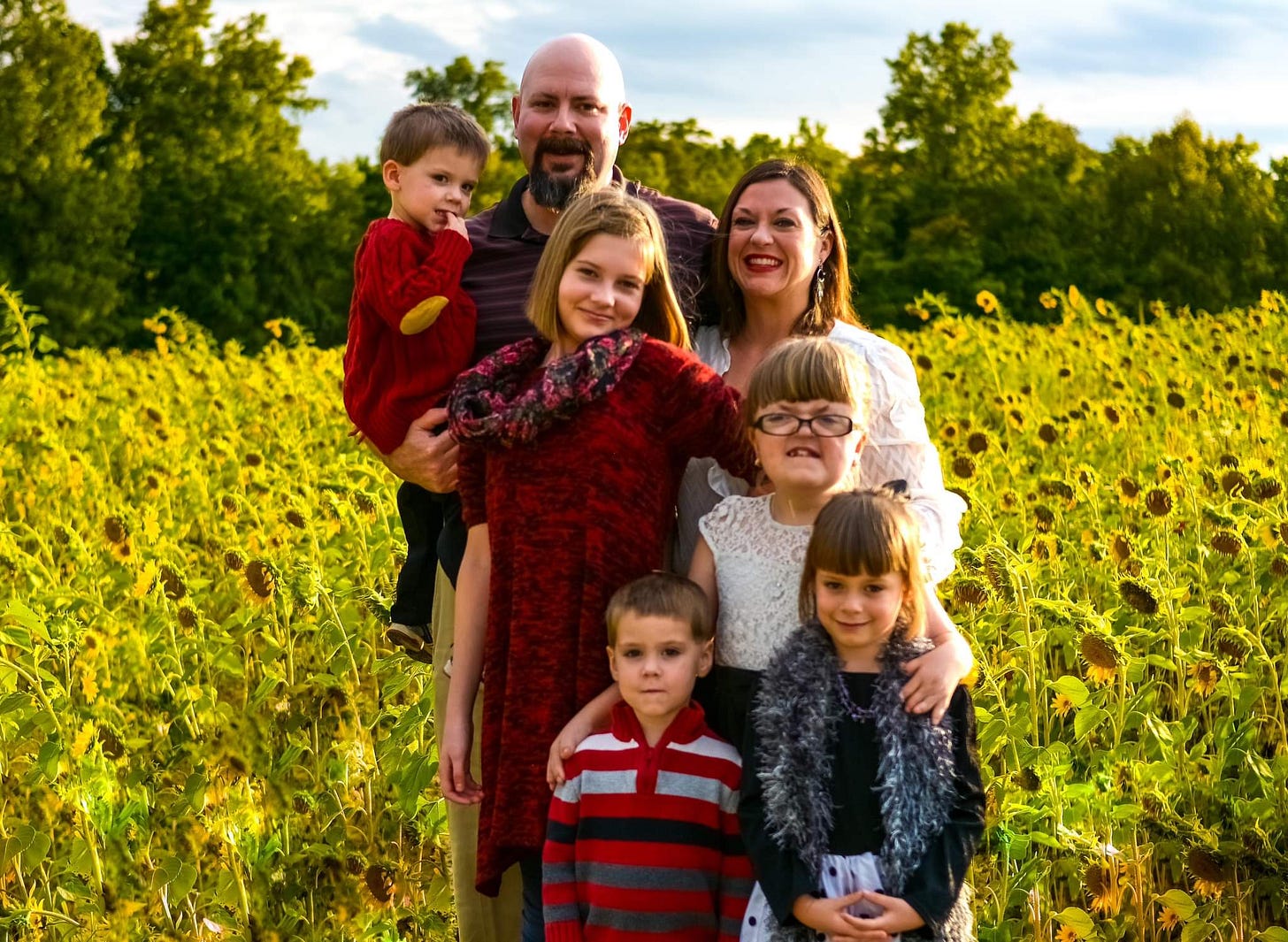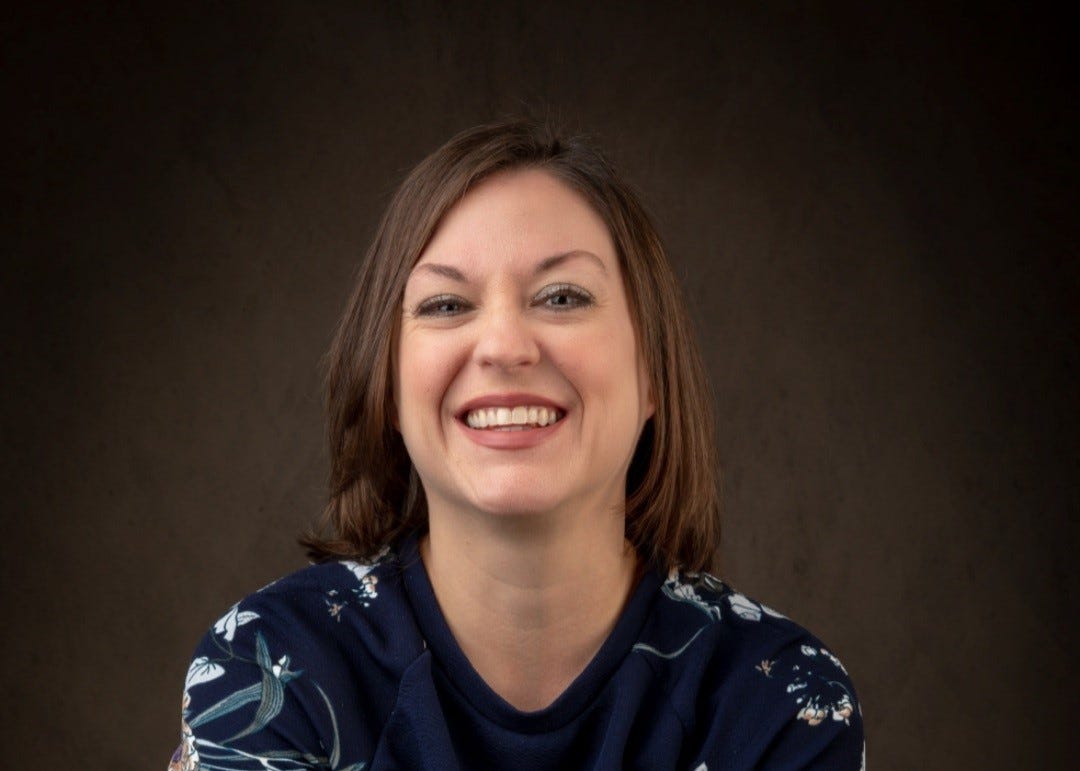Letter from a fellow optimist: Jeannie Ewing on responding to the moment you find yourself in
"Before we begin, let’s breathe."
Hi fellow optimist-in-progress,
This week’s post is the first instalment of Letters from a Fellow Optimist, where I hand the mic over to someone else who’s trying their best to live a life full of hope.
Today’s letter comes from Jeannie Ewing. I first came across Jeannie’s writing via her touching notes here on Substack. Often featuring her daughter Sarah, and all the wisdom she has to offer at the tender age of 12, Jeannie’s notes always brighten my day.
Aside from being a wonderful Mum and beacon of joy, Jeannie is a wonderful writer. I asked her to write a letter to you all—something honest about her relationship with trying—and, as always, she delivered something beautiful.
I’ll let her take it from here!
Dear Reader,
Before we begin, let’s breathe. I know, I know—we hear about the importance of breath all the time, but really, it is the Life-Breath. Breath sustains us. If you are overwhelmed, as I am often and especially now, you might notice that you are oxygen-deprived. Right now I’m trying to quiet my monkey mind, and staring outside my bedroom-slash-office window while taking three breaths through my nose shifts that alarm inside.
Breathing is grounding.
Now, I’d like to thank you for pushing pause on your life right now and taking around ten minutes to be fully present. Maybe that sounds corny or strange, but I think it’s necessary. I think it’s vital. You and I live in an exhausting, chaotic world, and in order for us to move beyond survival, we have to learn to hold still every day, even for a short time.
I want you to know I am here with you.
We don’t know each other, but we are connected by invisible threads, linking your heart to mine. Right now, I am sending you my love, through space and time, across oceans and prairies and tundras and deserts and mountains.
What is it you need in this moment? I’m not sure I can tell you there are answers or solutions to the heavy, unresolved burdens you’re carrying. What I can tell you is this: It is more than enough to “live the questions,” as Rilke once wrote in Letters to A Young Poet. What I think he meant was to practice sitting in the tension between the past and future and to learn how to surrender to the invitation of this moment.
My daughter Sarah was born with a complex, rare genetic diagnosis over twelve years ago. Nothing made sense to me after that. I felt I was wrestling this dark figure, which was a shadow of all my fears, all my worries about death and the fragility of human life. I felt helpless, powerless. Until then, I found ways to manage my life through controlling the family calendar, by scheduling every event or activity, and living by a routine.
Before I continue, let me tell you that I now have five children, and living by a schedule and routine is pretty much a given in order to maintain some semblance of a predictable rhythm. But what I’m telling you about after Sarah was born, when I went deep within myself in what I’ll call my first existential crisis, is that I realized there was very little about life that I could shape.
And that terrified me.
What does it mean to hope, then? G.K. Chesterton once wrote that “as long as matters are really hopeful, hope is a mere flattery…It is only when everything is hopeless that hope begins to be a strength at all.” I think he meant that hope isn’t some sort of pie-in-the-sky sunny optimism. It’s about believing that something greater lies beyond the present darkness of our situation. That’s when hope becomes hope: when there’s no obvious reason to believe that life will get better, that things will improve.
And I’m not going to tell you that life will get better, because I don’t know what your life has in store for you. What I will tell you is that life ebbs and flows; it moves through currents of desolation and consolation, through periods of fading and flourishing. That’s what I know about life. It is never stagnant, not forever, at least. It might feel that way—that you’re stuck—and maybe you are. If so, stay there in the tension of your stuck-ness. It will pass. I promise it will pass.
How do I know? Because five years ago, I wanted to die. I woke up every morning, and my immediate thought was, Why didn’t I die in my sleep? The only thing that kept me going was the faint question—was it hope?—that asked, Don’t you want to know how your life turns out in five years?
Sarah’s birth threw me into my first tailspin, when I concluded that life didn’t make sense and I couldn’t control how, or when, she would die or I would die. And five years ago, at the onset of the global pandemic, I muddled through postpartum depression with a newborn and four other tiny humans, believing that life would never be more than going through the motions.
Well, all I know is that what moves me through the darkness is surrendering to it. Mystery exists in dark places, and life gestates there, too: in the chrysalis, in the womb. Your darkness, right now, is where the seeds are germinating beneath the surface. You can’t see them, and you don’t know when they will sprout. So sit inside your darkness, and ask what it wants to tell you. Yielding to what cannot be explained or understood and accepting mystery is the beginning of interior peace.
With love and hope,
Jeannie Ewing

A Few Questions for Jeannie
Has your relationship with optimism changed over time? How so?
Yes. I would not consider myself a natural optimist at all. In fact, I have a tendency toward melancholy. I was always labeled a pessimist or “Negative Nelly” growing up. Obviously this was not a compliment, so I internalized that to mean something was wrong with me.
Now I’m in my forties, and I know that’s not true. Optimism is a muscle that can be built, and I don’t believe it means wearing rose-colored glasses, either. It’s not about denial or sweeping things under the rug or ignoring hard things or sugarcoating our pain. It’s about finding ways to examine ourselves and our relationship to our struggles, finding meaning in the midst of mystery and loss.
Optimism is about never giving up.
Is there a quote, belief, or perspective that’s helped you lately?
My spiritual director recently told me that all I have to do is “show up every day with a good heart,” and now I repeat that as a sort of mantra every day.
What’s one small, silly, or sacred thing that’s been cheering you up?
I wouldn’t say this cheers me up, but I will say it keeps me sane and grounded when things don’t make sense, and it’s this: telling myself that all I need to do is respond to the moment I find myself in. That’s all. I don’t need to do or be anything other than who I am in this moment.
I hope something in this letter found its way to you. If you’d like to leave a note for Jeannie, please comment below—she’ll be reading!
You can find more of Jeannie’s work here.
Until next time,
Emma x









I felt every word of Jeannie’s letter, especially the reminder that mystery exists in dark places. What a gift to be reminded that we don’t have to rush our way out of the hard seasons!!
Thanks for the image of the seeds germinating during the dark times